Highly
Profitable Currency and Forex Trading
in An Age of Profound Weakness in The Dollar
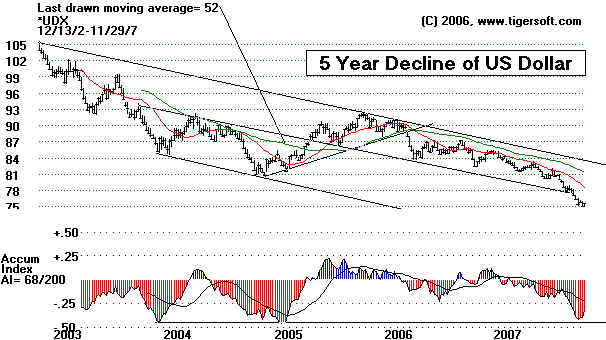
How do you protect yourself when your country's
currency goes
down
and down, at an increasing rate? If we lived in any
other country
where
the trade balance was so bad and the national debt was so high,
our
currency would be much, much lower and interest rates would probably
be set
at 15% to attract foreign investments! The Dollar has been going
down
steadily. At any time now, its rate of descent could accelerate and a
panic
could start. So, what do we do?
Buying Gold or old stocks is the certainly the
most commonly heard
answer. We have been recommending this since
December 2005. Use the Tiger
charts
to trade them, if you like, and to decide which is better, Gold Bullion
or
Gold Stocks.
------------------ US Dollar and Gold Move Inversely. ---------------------------
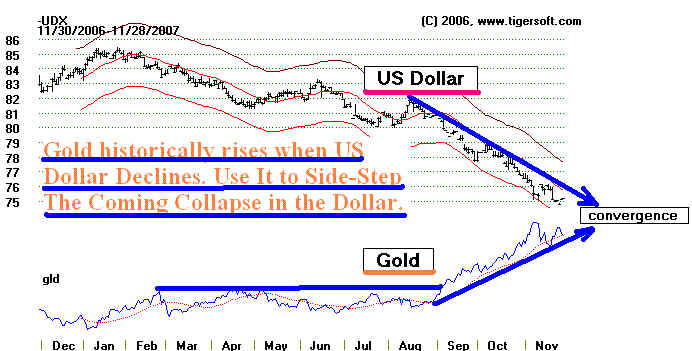
-----------
TigerSoft Lets You Trade Gold Stocks Very Profitably. --------------------
TigerSoft's automatic Buys and Sells have garnered 106% this
past year.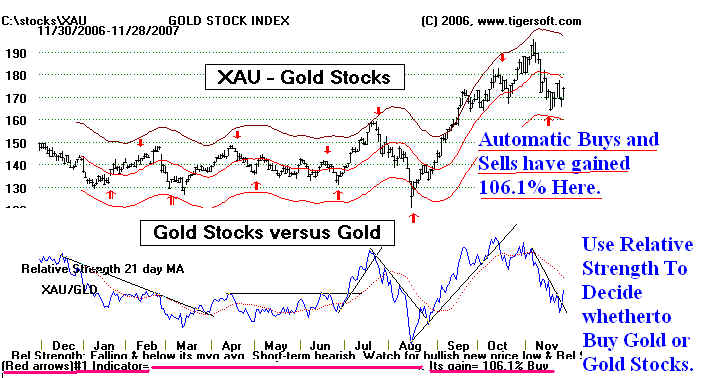
====================================================================================
Introduction
Besides gold bullion and
gold stocks, there are other direct steps you might
take to avert personal financial disaster because of the developing collapse of the US
Dollar.
The easiest is to learn how to Buy foreign currencies or, at least foreign currency ETFs.
This can be hugely profitable. You will note that we are only considering the most
liquid
forms of dealing with a weak dollar. Buying Picassos or "Inverted Jennies"
(rare US stamps)
works over a long time. But it takes too much time to sell these. In addition,
we have
recommended foreign stocks and ETFs. But these are very over-extended and could
contract sharply at any time. So, we want here to consider only Gold,
Currency
Speculation and Currency Exchange Traded Funds. You will see that TigerSoft gives
you the advantage of many seeing what insiders ae doing, using the Tiger Accumulation
Index.
Currency speculation has increased dramatically. It is estimated that in 1975 80%
of foreign exchange transactions were commerce related. Currencies changed hands to
allow oil, cars, TV sets, etc to be imported or exposted, Today, some estimate that
number
to be under 10%. Computerization is one of the key factors. Transaction costs
have come
way down. Another reason is Nixon's taking the US off the Gold Standard and allowing
the US Dollar to float.
( http://64.233.167.104/search?q=cache:A1BVZ8pomrwJ:www.twnside.org.sg/title/nar-cn.htm+%22currency+speculation%22+fortunes+made&hl=en&ct=clnk&cd=1&gl=us&client=firefox-a
)
1. Currency Speculation Has
Made Some Very Famous
People Rich: John Meynard Keynes, George Soros...

Back in the 1920's, insider trading was a standard
business practice.
Keynes was an adviser to the
Chancellor of the Exchequer
and the Treasury from
1915 to 1919. Among his
responsibilities were the design
of terms of credit between
Britain and its continental
allies during the war, and
the acquisition of scarce
currencies. He was the
British Treasury's representative
to the Paris Peace Conference
of 1919. His observations
appeared in the highly
influential book The Economic
Consequences of the Peace in 1919,
followed by
A Revision of the Treaty in 1922.
Using statistics provided
to him by the German
delegation, he argued that the
reparations which Germany
was forced to pay to the victors
in the war were too large, would lead to the ruin of the
German economy and result in
further conflict in Europe.
These predictions were borne
out when the German
economy suffered in the hyperinflation
of 1923. Only a
fraction of reparations were
ever paid.
( http://en.wikipedia.org/wiki/John_Maynard_Keynes
)
John Maynard Keynes began his career as a speculator in August 1919, at
the relatively
advanced age of
36 years. Keynes traded on high leverage - his broker
granted him a margin
account to trade
positions of £40,000 with just £4,000 in his account. He traded currencies including
the U.S. dollar,
the French franc, the Italian lira, the Indian rupee, the German mark and the Dutch
florin.
His work as an
economist led him to be bullish on the U.S. dollar and bearish on European currencies,
especially
the German Mark.
He traded accordingly, usually going long on the dollar and short selling European
currencies.
Easter 1920 found
Keynes vacationing in Rome. He learned that his open currency trades had made him a profit
of £22,000 on francs and a
loss of £8,000 on U.S. dollars...
But he Keynes soon learned that short-term currency trading on high margin, using only his
long-term
economic predictions as
a guide, was foolhardy. By late May, despite his belief that the U.S. dollar should rise,
it didn’t. And the
Deutschmark, which Keynes had bet against, refused to fall. To Keynes’s dismay, the
Deutschmark began a
three-month rally. Keynes was almost wiped out.
Whereas in April he had been sitting on net
profits of £14,000, by
the end of May these had reversed into losses of £13,125. His brokers asked Keynes
for £7,000 to keep his
account open. A well known, but anonymous, financier provided him with a loan of £5,000.
Sales of Keynes’s
recently published book The Economic Consequences of Peace had turned out to be
healthy and a letter to
his publisher asking for an advance elicited a check for £1,500. So, Keynes was able to
scrape together the
money he needed to continue trading, but he learned a valuable but painful lesson in
trading.
As he said, "The market can stay irrational longer than you can stay
solvent.” Determined to achieve
financial independence,
Keynes began trading again. He traded more prudently than in his dramatic early months,
using shorter-term
trading indicators and, by December, he was able to pay back the £5,000 loan to his
benefactor.
In the following four
years, Keynes continued to trade using high margin. In 1921 he expanded his trading
activities
to include commodities
- first cotton and then metals, rubber, jute, sugar and wheat - and stocks. By the
end of
1924 he had amassed net
assets of £57,797. The Crash of 1929 hit him hard,
but he soon recovered by using
| his knowledge of
currencies, which had acquired in an official capacity, and quite possibly using his
many contacts.
Bertrand Russell named Keynes as the most intelligent person
he had ever known, commenting,
"Every time I
argued with Keynes, I felt that I took my life in my hands, and I seldom emerged without
feeling
something of a fool." (Source: http://en.wikipedia.org/wiki/John_Maynard_Keynes
)
(Additional Sources: http://www.maynardkeynes.org/keynes/keynes-the-speculator/
R.F. Harrod - The Life Of John Maynard Keynes, 1951 which I read years ago in
Graduate School.)
------------------------------------------------------------------------------------------------------------------------------------------------------
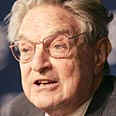 GEORGE SOROS
GEORGE SOROS
George Soros was born Jewish in Hungary 76
years ago. He miraculously escaped the
Holocaust at the age of 17 when he fled to the West, completed his economics studies in
London,
moved to the US, and quickly became part of the New York financial community. Bright
and daring,
he was one of the first hedge fund operators, set up for investors willing to take high
risks. His most
famous financial adventure was in selling short the British Pound in September 1992, at a
time the British
were desperately, but unsuccessfully, trying to halt an inevitable devaluation in the
sterling. His move
made a billion dollar profit for himself and his clients in one day!
Soros Currency Speculation - On Black
Wednesday (September 16, 1992), Soros
became immediately famous when he sold short more than $10 billion worth of pounds, profiting from
the Bank of
England's reluctance to either raise its interest rates to levels comparable to those
of other
European Exchange Rate Mechanism countries or
to float its currency. Finally, the Bank of
England was
forced to withdraw the currency out of the European Exchange Rate Mechanism and to devalue
the
pound
sterling, and Soros earned an estimated US$ 1.1 billion in the process. He was dubbed
"the
man who broke the Bank of England."
The Times October 26, 1992, Monday quoted Soros as saying: "Our total position
by Black
Wednesday had to be worth almost $10 billion. We planned to sell more than that. In fact,
when
Norman Lamont
said just before the devaluation that he would borrow nearly $15 billion to defend
sterling,
we were amused because that was about how much we wanted to sell."
According to Steven Drobny,[9]
Stanley
Druckenmiller, who traded under Soros, originally saw the weakness in the pound.
"Soros' contribution
was pushing him to take a gigantic position," in accord with Druckenmiller's own
research and instincts.
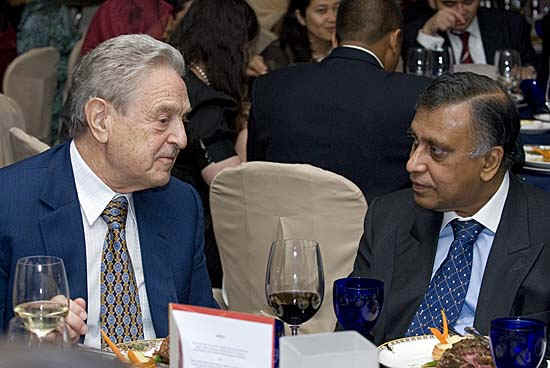
The man George Soros is talking to "used as much as RM30 billion of tax payers' money
and colossaly
lost it all in the Bank Negara's Forex scandal between 1992 to 1994. The chapter
has
not closed as the
money has never been accounted for. Ten years later, in 2004, the same
Malaysian-born money speculator, aka Top
Cat, was made a Finance Minister.
( http://www.jeffooi.com/2006/12/two_money_speculators.php
)
Soros' Malaysian Speculation Made Him Enemies.
In 1997, during the Asian financial crisis,
then Malaysian Prime Minister Mahathir bin Mohamad accused Soros of using the wealth
under his control
to punish ASEAN for
welcoming Myanmar as a
member. Later, he called Soros a moron.[10] Thai
nationals have called Soros "an economic war criminal"
who "sucks the blood from the people".[11]
( http://en.wikipedia.org/wiki/George_Soros
) It is a fair question, I think, how much damage is done
by short selling collapsing currencies. Mexico is close by where I live.
People there are poor. Driving
down the currency of a poorer, underdeveloped company creates a "fire sale" for
that country's assets.
So, making their currency go down even more - and momentum players always push things to
an extreme -
poses real moral problems for me. I understand the temptations of short selling a
weak currency. Currencies
collapse faster than they rise. Our Tiger Accumulation Index often works better at
finding currencies that are
going to advance. Canadian Prime Minister recognized the truth:
"We cannot simply expect those famous
currency speculators to shut off their computer terminals, hang up their red suspenders
and get a life."
(See http://www.iht.com/articles/1997/07/30/baht.t_19.php
)
A Canadian New Democrat wrote: "Speculation not only destabilizes financial systems,
it also is
an economic virus that kills real investment. It is estimated today that only 5 to 10
percent of financial and
currency transactions are related to trade and production, while 90 to 95 percent of these
transactions are
purely speculative. Instead of chasing productive investments, money chases money to yield
paper profits.
Paper entrepreneurs, "the guys in red suspenders", have taken over and diverted
money to unproductive
activities. The economy becomes a casino where money is made on money simply because
someone guessed
it right. What is accomplished, at best, is of no value to society. ( Lorne Nystrom, MP, " Taming Currency
Speculators", May 1999, The New Democrat: http://globalpolicy.igc.org/socecon/glotax/currtax/ndp.htm
)
While I was writing my dissertation in the late 1960's in London, I frequently heard
reference
to the currency speculating Gnomes of Switzerland. They were blamed for forcing
Harold Wildon's
Labor Government to devalue the Pound. The French refer to self-interested
"Anglo-Saxon" currency
speculators. Consider how easy it is for any nation's
politicians to blame foreigners for financial
problems the politicians have really created.
Soros' Economic Philosophy and His Quantun Fund's
Traders to watch on TV:
George Soros's most successful partners at Quantum fund have been Jim Rogers, Victor
Niederhoffer,
and Stanley Druckenmiller, all of whom are famous traders in
their own rights. Soros warns that "the current
system of financial speculation undermines healthy economic development in many
underdeveloped countries.
Soros blames many of the world's problems on the failures inherent in what he
characterizes as
market
fundamentalism. He warns of irrationalism in the markets and dangerous
follow-the-fashionable-
trend excesses. This is called "dynamic disequilibrium" by Soros and
"irrational exuberance" by Greenspan.
Others call it a "bubble". I like the term "piffle".
Corporations are big currency traders. They usually are hedgers. To ensure
that they
are paid what they expect to be paid in contracts involving millions, they may sell short
the foreign
currency. If they do not, a 10% reduction in the currency during the time it takes
to deliver, say,
a steel mill and be paid, may turn a profit into a very big loss. The wilder a
country's currency
swings up and down, the more hedging is likely. Foreign corporations. and certainly
the Chinese
corporations, are undoubtedly trying to lessen the losses incurred by the declining dollar
by selling
the currency short. The high degree of leverage that they can use readily invites
this.
2. Central Banks Can Strengthen A
Currency:
Raising Interest Rates and Buying Their Own Currency.
But Outright Protectionism Backfires and Can Make for
Violent Currency Swings.
Before
we speculate on a currency's fluctuations, we would do well
to know the degree to which
government policies can suddenly move a currency. This makes
currency trading much riskier.
Governments like to surprise, even punish, speculators in its currency.
When they suddenly raise
interest rates or pour hundreds of million into efforts to buy up their own currency in
the Foreign
Exchange Markets, they make financial waves that change technical trends that many
speculators
rely upon. Their intent is usually to shore their currency up, in
part, because they try to make their
financing responsibilities easier to discharge. They want their country's bonds to
be attractive and easier
to market. Hot international money will flow to where it can get the best rates.
That influx usually stops
currency speculators cold. Similarly, when word gets out that interest rates are
going to be lowered, expect
that currency to be under pressure. That is partly why the US Dollar is in such a
steep downtrend now.
Speculators expect more Fed discount rate cuts to help prevent a recession before next
Presidential
Election. (Elsewhere I shown that the Fed's activities before the Presidential
Election year are
highly political.) ( http://www.gata.org/node/5723
)
Usually a nation's banks want a strong currency. The US Treasury Secretary, whoever
he is,
always gives it lip service. Not to do so, would start making traders and bankers
alike believe
it was US policy to drop the dollar intentionally. That would start a run on the
dollar.
It is a sign of how bad the US Dollar's current situation is that US banks now want
"cheap money"
to let them get past the enormous lack of confidence in financial institutions owing to
years of easy loans
to poor credit risks, all to make short term profits. This is quite remarkable. In
writing my dissertation,
which was about British Chancellors of The Exchquer from 1919 to 1937, I found that
the preferred policies
of London's financial community were always upheld by the Bank of England and always
promoted by
the Chancellor, no matter what party he came from. The "view of the City"
was always that they wanted a
stronger British Pound. Of course, it meant more profits. The more hot money
that came into Britain, the
more they could lend out and make profits from. They featured the strong Pound every
time they flew the
nationalist and pro-Empire Union Jack banner. Always they sought reduced government
spending,
balanced budgets and interest rates that were tight enough to make the British Pound seem
the paragon
of enduring stability.
Consider some cases. In June 2001, Brazil's
Central Bank President, Arminio Fraga, suddenly
hiked Brazil's interest rates by 150 basis points (1.5%) to 18.25%. This was "three times what the market
had expected. The move, quickly followed by the bank's purchase of an estimated $320
million in Reals on the local market, stopped a run on the Brazilian currency dead in its
tracks. "It was a master stroke," says Marcelo Mesquita, head of equities
research at UBS
Warburg in Sao Paulo."
( "Sparring with Currency Speculators" - http://www.businessweek.com/magazine/content/01_28/b3740158.htm
)
In another case, currency speculators in the Japanese
Yen were warned by the Prime Minister:
As you can see in the TigerSoft chart below, when the Japanese moved to an 18-month
high of Y109.
13 to the US dollar in mid November on Monday night, Mr Fukuda said: "In the short
term, yen
appreciation would certainly be a problem. Any kind of sudden change in exchange rates
would not
be desirable." He stopped short of threatening Japanese intervention in
the currency markets, but
said: "Speculative movements need to be kept in check. What I am saying is: 'Be
careful, so that it
[intervention] will not happen.'" Earlier his Cabinet Secretary had helped the
Japanese Yen rally
by saying "a high yen is basically good for Japan." We
would simply have bought the yen twice
in the chart below, where the Buy shows that prices crossed back above the 50-day mvg.avg.
and
on the breakout B23 after massive insider buying in October. A 10% profit in five
months makes
a nice currency trade. Breakout buying gets you much quicker action. But use
the Tiger
Accumulation Index to authenticate the breakout.
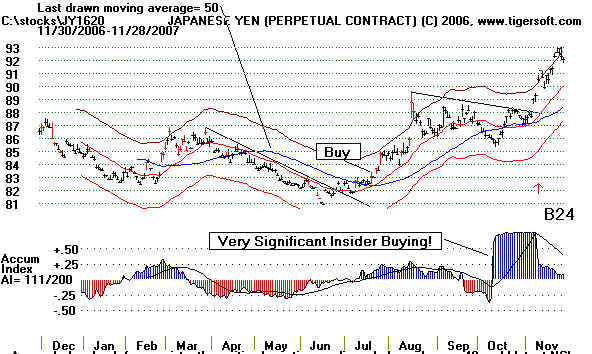
Protectionism
Usually Fails
The US Government may
also try to protect the Dollar and US jobs by restricting imports through
tariffs, quotas or import regulations. US governments have done little to protect
the loss of blue collar
manufacturing jobs in my life time. With off shore outsourcing, white collar jobs
are being lost in the
millions. Protecting the remaining US jobs will inevitably become an issue in the next
Presidential Election.
Perhaps, the debate will stay focused on illegal immigration. But if it turns to US
jpbs lost overseas,
there will be a groundswell for protectionism, as people feel more jobs are preferential
to the possibility
of higher imported prices. So long as China does not revalue its currency vis-a-vis
the US, job protectionism
will to be very politically expedient campaign platform in 2008.
But, all protectionism invites a backlash and retaliation. Trade wars make currency
trading more
difficult becuase of frequent sudden changes in prices as each new governmental action is
suddenly
factored in. Republicans have since the 1830s been more pro-tariff than the
Democrats.President McKinley
stated "Under free trade the trader is the master and the producer the slave."
But in the 1930's, the
the very protectionist Hawley-Smoot Tariff Act exacerbated the Great
Depression, Republicans in the
White House and Congress since Eisenhower have mostly become free traders. But that
may change.
Or else, the Democrats will shift places on this issue witht he Republicans. The
main point is that
protectionism will probably be a growing force politically in the US. And that will
disrupt trade
and currencies, especially as the possibility of trade wars edges into sight. Proectionism
makes
for more violent swings of the pendulun of currency prices, and that, itself, makes for
more
protectionism.
The BBC reported this month that: "the US Government was planning to
introduce more punitive tariffs,
this time on a range of textiles and lingerie products manufactured in China, triggered
fears about a return
to protectionism and the impact that this might have on the recent recovery in the US
economy. Retaliatory
action Traders are fearful that America's actions could spark retaliatory action by China.
A week ago the
World Trade Organisation ruled against similar import tariffs that the United States had
imposed on steel
imports from around the world. China - already been hit hard by the US steel restrictions
- responded
immediately by calling off buying a shipment of US soybeans.
==================================================================================
3. Trading Foreign Currencies: EURO: 2000-2007


I want
to show you how to trade the EURO using TigerSoft tools, especially
the Tiger
Accumulation Index, the 50-day moving average
and chart patterns that show resistance
or support. Start with the weekly chart.
Trade with the trend.
Now let's begin here with some basics about trading foreign currencies. If
you think a currency is going
up you can but the currency outright, using the FOREX, or
you can buy ETFs for that currency.
FOREX Trading. The Forex market is a non-stop 2 trillion
dollars per day cash market where currencies
of nations are traded, typically via brokers. Foreign
currencies are constantly and simultaneously bought and sold
across local and global markets and traders' investments increase
or decrease in value based upon currency movements.
1.
The "Forex"is the abbreviated form of Foreign Exchange; it is also referred as
the "Spot FX" market.
In Forex trading, the currency of one nation is traded for that
of another. Therefore, Forex trading is always traded
in currency pairs. The most commonly traded currency pairs are
traded against the US Dollar (USD). The major
currency pairs are the Euro Dollar (EUR/USD); the British Pound
(GBP/USD); the Japanese Yen (USD/JPY)
and the Swiss Franc (USD/CHF).
2. 24-hour
trading, 5 days a week with non-stop access to global Forex dealers.
3. An
enormous liquid market making it easy to trade most currencies. Order are executed at
the fourth decimal point for the EURO. Example the EUR/USD
might trade at 1.4607 dollars per EURO.
4.
Leveraged trading with low margin requirements. One
of the big reasons that Forex trading is an entirely
different animal than stock trading or futures trading is leverage.
Forex trading leverage can be enormous,
as high as 400:1, and in most cases you get to choose the amount of
leverage or gearing you want to trade with.
You can control $100,000 with only $250. Hold this many EUROs, on
a move of the Euro from 1.23 to 1.249,
or 2%, and you make $2,000 from only $250. But nothing is quite
that easy, if the price drops by very much you
will automatically be sold out by your broker, unless you have a lot
more money in the account. Still, you could
easily have made many trades like this, using the tools TigerSoft
offers.
5. In some
cases, no commissions. But you have to buy from brokerage's Dealer.
Here are
some randomly selected links on Forex trading:
http://www.finweb.com/forex-trading/
http://www.traderslog.com/forex-leverage.htm
ETFs In June 2007, the Rydex Group created six more
currency-based exchange-traded funds to
add to its immediately popular EURO ETF - FXE. These
are "exchanged traded funds" which are bought and
sold on the New York Stock Exchange. These ETFs -- the
CurrencyShares Australian Dollar (NYSE: FXA),
British Pound Sterling (NYSE: FXB), Canadian
Dollar (NYSE: FXC), Mexican Peso
(NYSE: FXM),
Swedish Krona (NYSE: FXS), and Swiss Franc
(NYSE: FXF)
funds -- were created to track the price
movements of these currencies. These new creations follow
the first-ever currency ETF, the Euro Currency
Trust (NYSE: FXE), which Rydex launched at
the end of 2005. These are designed to rise in value when the foreign
currency strengthens relative to the U.S. dollar and fall
when the euro weakens.
The
ETFs do not provide any cash income. It seems they could and should. Someone
should
ask Rydex why that is. They apparently keep the
income as profit. There is also no ETF for the Japanese Yen, yot.
You will make money buying FXE (Euro Currency) when the
Euro rises versus the Dollar. This can be
demonstrated below. Compare the moves of FXE and the
EURO. For all practical purposes the EURO
and the FXE are identical. Even our internal strength
indicators (the OBV Line, the Tiger Accumulation
Index and the ITRS are very similar. The two main problems
with the FXE are that it is more thinly traded
the currency and is not traded 24 hours day. As a
result, there is slippage. You are apt to lose the
difference between the bid and ask with each and you will
have to trade only when the NYSE is open.
------------------------------------------------ EURO
-------------------------------------------------------------------------------
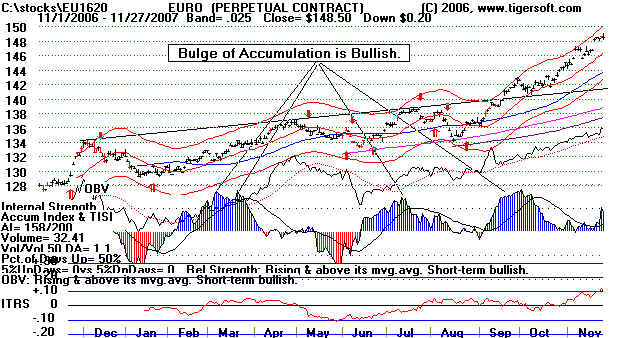
------------------------------------------------ FXE (Euro
ETF traded on NYSE) ---------------------------------------------
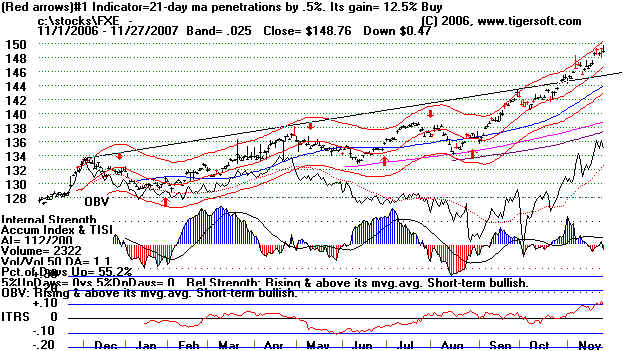
More will be added later.
http://www.cartoonstock.com/directory/s/spends.asp
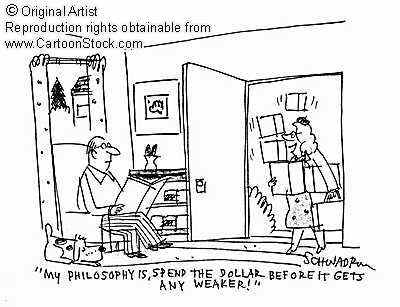 
|





 GEORGE SOROS
GEORGE SOROS






